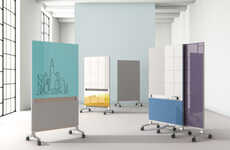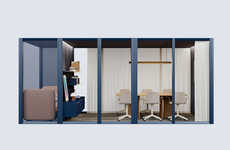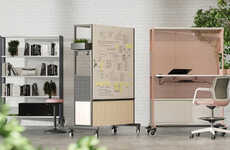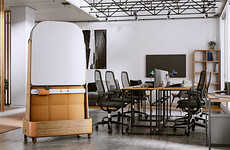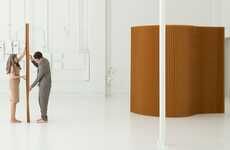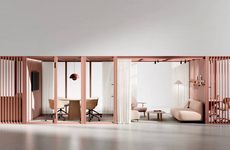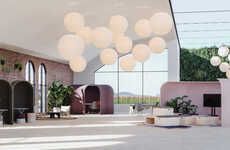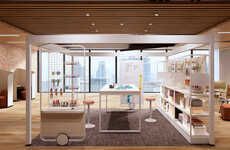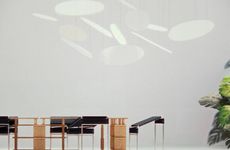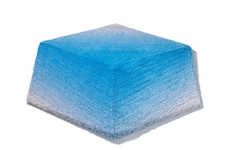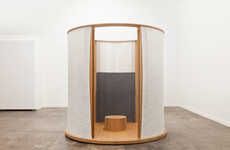
Stéphane Malka's Workspace Barriers Offer Mobile Design for Agoratic
M — April 5, 2016 — Art & Design
References: agoratic & designboom
To bring an element of mobility to computer brand Agoratic's offices, design firm Stéphane Malka put together a series of flexible office walls called 'MuMo' that can be rearranged accordingly to suit the space. The walls can be customized to suit different working environments and continuously reconfigured thanks to its moveable parts.
Unlike traditional walls that are fixed from the floor to the ceiling, the MuMo walls are suspended panels that float three millimetres off of the ground and are hinged to the ceiling as doors. The panels can then be moved along a rack fixed to the ceiling to provide enclosed spaces in a variety of different layouts. The MuMo walls create flexible workspaces within the company while the black and white monochromatic color sheme adds an illusionary element to the office.
Photo Credits: designboom, agoratic
Unlike traditional walls that are fixed from the floor to the ceiling, the MuMo walls are suspended panels that float three millimetres off of the ground and are hinged to the ceiling as doors. The panels can then be moved along a rack fixed to the ceiling to provide enclosed spaces in a variety of different layouts. The MuMo walls create flexible workspaces within the company while the black and white monochromatic color sheme adds an illusionary element to the office.
Photo Credits: designboom, agoratic
Trend Themes
1. Flexible Office Walls - Designing and integrating flexible walls as a workspace feature can transform traditional office designs and adapt to new ways of work.
2. Moveable Workspace Components - Incorporating moveable components to furniture in workspaces or in any large-scale environment can create adaptable and transformable layouts to meet the unique needs of individuals and groups.
3. Suspended Panel Walls - Utilizing suspended panels as walls can provide unique and modern design features that alter the traditional work environment and add variety to spaces.
Industry Implications
1. Architecture and Interior Design - Creating innovative workspace designs and furniture components can provide new opportunities for architecture and interior design sectors to adapt to more flexible office layouts.
2. Office Furniture Manufacturing - Designing and manufacturing flexible furniture components within workspaces can cater to the need for adaptable and modular office systems while maintaining aesthetic appeal.
3. Saas Companies and Tech Start-ups - Creating workspace environments and associated products involving innovative and modern design may attract tech start-ups and SaaS tech companies that demand functional and stylish workspace features.
3
Score
Popularity
Activity
Freshness


